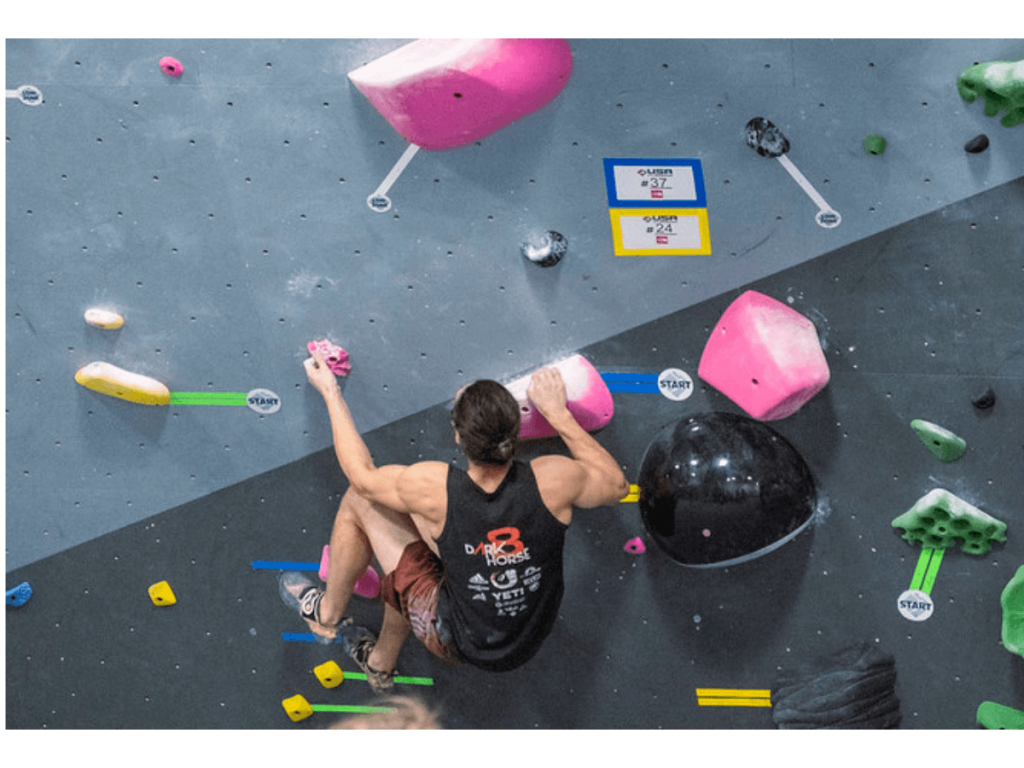Starting rock climbing can be overwhelming, but we’re here to help you try your hand at scaling walls. From tips to beginning your climbing journey to how to progress, this article will help you get climbing in no time.
1. Find a climbing gym: Look for a local gym with indoor climbing walls. These gyms provide a controlled environment with routes of varying difficulty levels, making them perfect for beginners to learn and practice.
2. Take an introductory course: Enroll in a beginner’s climbing course at the gym. These courses cover essential skills such as proper equipment usage, climbing techniques, and safety procedures. In addition, you’ll learn how to tie knots, belay (the method of securing the climber), and adequately use climbing gear.
3. Get the necessary gear: Start with essential climbing gear, including climbing shoes, a harness, a helmet, and a chalk bag. You can rent or borrow gear initially, but consider investing in your equipment as you progress!
4. Practice proper climbing techniques: Once you learn proper climbing techniques, practice these on the wall well below your pay grade so you burn them into your brain.
5. Climb with experienced climbers: Join a climbing community or find a mentor to guide you in your early climbing days! Climbing with experienced climbers will enhance your skills and teach valuable tips and safety practices.
6. Gradually progress to outdoor climbing: Consider transitioning to outdoor climbing once you feel confident in the gym. Start with more accessible routes until you can tackle more challenging climbs.
7. Emphasize safety: Climbing involves inherent risks; always prioritize safety! Double-check knots, use proper belaying techniques, and communicate effectively with your climbing partner. In addition, if you’re planning to climb outside, be aware of potential hazards such as loose rocks and weather conditions for the area.

The Ideal Age Range for Starting Rock Climbing
While there is no ideal age range for beginners to start rock climbing, there are simply advantages to starting younger. Children and teenagers who start climbing young benefit because they learn proper climbing techniques early and can focus on strength development later in life.
There is no upper age limit for starting rock climbing either! Climbing gyms have programs for adult beginners that gradually focus on technique, safety, and building strength. Progress at your own pace and enjoy the physical and mental challenges climbing offers.
While rock climbing may be physically demanding, older adults with good health and a reasonable fitness level can enjoy the sport!
(It’s essential to consult with a healthcare professional before starting any physically demanding activity and to approach climbing with appropriate caution and consideration for personal limitations)
3 Main Types of Climbers
Boulderers, sport climbers, and trad climbers are the main climbers in the wild. Bouldering requires the least amount of gear and is the most accessible, while sport climbing requires more technical knowledge. Furthermore, trad climbing involves a lot of technical expertise to do.
Bouldering: Climbing around 15 ft up using crash pads (or big foam pads in gyms).
Sport Climbing: Using a rope and quickdraws, the climber clips into preplaced bolts in the wall to connect the rope as they ascend.
Trad Climbing: Using a rope and pro (protection), the climber places protection in the weakness of rock, such as cracks and seams, to clip the rope to.
Many gyms offer introductory courses in bouldering and sport climbing. If you’re interested in trad climbing, seek a professional or mentor to show you the ropes!
Essential Gear for Starting Rock Climbing
All you need to start rock climbing for a beginner is a pair of climbing shoes! Climbing gyms are great for beginners because you can save money on the gear associated with the different climbing disciplines. You can rent shoes, chalk bags, and even harnesses at a rock climbing gym to find out if you’d like to invest in them!
If you enjoy climbing, pick up a pair of climbing shoes so you don’t need to keep renting the rental ones at the gym.
Your next investment may include a harness or crash pad, depending on how you’re leaning. If you plan to climb only in the gym, skip the crash pad; these are only needed if you’re climbing outdoors. A rental harness will do if you plan to use the ropes sparingly.

Recent Comments